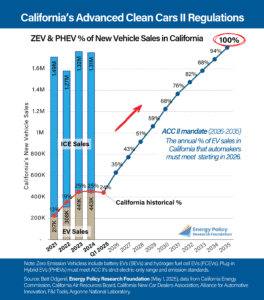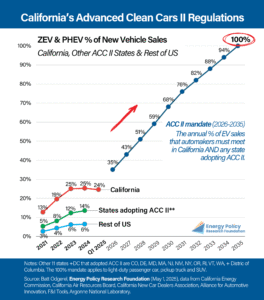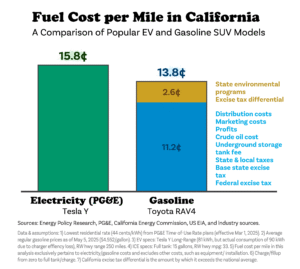U.S. summer (June, July, August) residential electricity costs are trending upward, rising from an average bill of $148 in 2020 to an expected $186 in 2025 (an annualized rate of 4.7%) (green line).
Conversely, demand has declined modestly at an annual rate of 0.5% from an average monthly usage of 1,116 kilowatt hours (kWh) in 2020 to an expected 1,086 kWh in 2025. This reflects cooling demand, efficiency gains, and demographic shifts. However, there is variability when reviewing the data regionally.
On May 29th 2025 at the Energy Policy Research Foundation offices in Washington DC, a joint workshop was cohosted by the Energy Policy Research Foundation and the Institute for Energy Research on the North American Energy Production Platform.
Energy policy has taken center stage, and the United States is at a pivotal moment in shaping its energy future. Cross-border trade of oil, natural gas, and electricity has made North America one of the most dynamic energy markets in the world. As each country responds to market dynamics and geopolitical shifts, the role of energy imports and exports across the three countries has never been more critical to understand.
With panels moderated by IER President Tom Pyle and EPRINC President Lucian Pugliaresi, energy policy experts participated in an in-depth look at the evolving landscape of energy development across the continent. The event provided a forum for candid dialogue on shared opportunities and challenges in shaping sustainable, secure, and economically sound energy strategies for North America.
The discussion, focused on North American energy trade, covered specifically:
The agenda of the workshop can be found here, and the presentations given can be downloaded here and here.
In an interview with Kevin Killough for JusttheNews, Energy Policy Research’s Director of Energy Transition Research Batt Odgerel discussed California’s Advanced Clean Cars II regulation and its potential impact on US carmakers and consumers. The article, “California likely to fight for EV mandate, but data shows that EV sales way below mandate targets,” was published May 22, 2025.
From JusttheNews.com:
“Batt Odgerel, director of energy transition research at the Energy Policy Research Foundation, compared the rate of EV adoption in California over the last few years with the future targets that California’s ACCII aims to achieve.”
“From 2021 to 2023, the percentage of new car sales that were electric vehicles rose from 13% to 25%. In 2024, there was no increase, and in the first quarter of 2025, it fell to 24%. The ACCII demands that the percentage of new car sales that are electric hit 35% by 2026.”
“Odgerel told Just the News that when the ACCII was being drafted – the rules were finalized in 2022 – it’s likely California officials thought the increases in electric vehicle sales would continue.”
“’It was still very high, and I think in that environment, California officials were probably blinded and assumed non-stop linear growth until 2035,’ he said.”
“The increases were also partly due to the state’s Clean Vehicle Rebate Project, which provided state-funded incentives for the purchase of new electric vehicles, in addition to federal tax credits. The project ceased taking new applications in November 2023.”
“’When the subsidies get exhausted, reality hits,’ Odgerel said.”
“He said that in the 11 other states and the District of Columbia that have adopted California’s ACCII, EVs are only 14% of new vehicle sales. The ACCII requires that 43% of all new car sales be electric by 2027. To reach that, the share of sales that are EVs in these other states and D.C. will have to triple in just two years. Adoption of the ACCII, Odgerel said, will not guarantee a successful transition to EVs.”
“’As such, the ACC II poses a major risk of resource mis-allocation across the country,’ he said.”
“’Ultimately, reaching the targets will require massive increases in state and federal subsidies,’ Odgerel said.”
“Odgerel also compared the California fuel costs per mile of a Tesla Model Y, the company’s newest model, to that of a gas-powered Toyota RAV4. California’s Model Y drivers will pay $0.158 per mile, and the RAV4 drivers will pay $0.138. In addition to these costs, charging infrastructure is still underdeveloped, he said, and the purchase price of EVs is higher than that of gas-powered vehicles.
“This entails increased burdens for consumers and higher energy prices across the board,” Odgerel said.
“He notes that the comparison is based on various assumptions, and actual numbers will vary in different cases. Likewise, without California’s gasoline policies, which drive up the cost per gallon, the savings for gas-powered cars would be even higher.
“The ACCII applies to car manufacturers and not to the buyers. So, if EV purchase and operation costs are not competitive with gas-powered vehicles, consumers will have the option of buying gas-powered vehicles in states that allow them or hanging onto their current gas-powered car.
“Therefore, a heavy-handed government approach could result in not-so-desirable second order effects like increasing ICE [internal combustion engine] car prices,” Odgerel said.
“Low consumer demand for EVs will also increase inventories on sales lots, something that has already become a problem in California and elsewhere. The situation could exacerbate the losses automakers have experienced with their EV lines.”


Also on this topic, see the Chart of the Week on Fuel Cost per Mile in California:

On Tuesday, May 23 2025 (DC time), the Economic Research Institute for ASEAN and East Asia (ERIA), the Institute of Energy Economics, Japan (IEEJ) and Energy Policy Research cohosted a virtual discussion on the role of LNG and natural gas in Asia and how Asia views LNG potentials from the United States in and after 2025.
The presentations from the webinar can be found below, and the recording of the event can be viewed here.
On Wednesday, April 2 2025, Energy Policy Research Foundation Distinguished Fellow and Asia-Pacific Energy Resource Centre Senior Vice President Glen Sweetnam provided witness testimony at the House Committee on Natural Resources Oversight and Investigations Subcommittee hearing on “Unleashing the Golden Age of American Energy Dominance.”
In his testimony, one of the reasons that Glen was positive about future oil production is that the U.S. oil industry is highly competitive and has demonstrated technological innovation and advanced industrial capabilities. The most efficient and productive oil companies in the world are in the U.S., and between 2010 and 2020, the U.S. served 90% of incremental demand.
Glen’s testimony was highlighted on Forbes Breaking News (Glen’s reply starts at 2:33)
Another article about the hearing appeared on JustTheNews, which quotes Glen’s response to Resident Commissioner Pablo José Hernández of Puerto Rico.
Glen’s testimony and accompanying slide deck can be found below, along with the testimony of the other witnesses at the hearing. A full video of the hearing can be found here.
The Energy Policy Research Foundation is pleased to announce the addition of François Baird as our newest Distinguished Fellow! François brings a wealth of knowledge and experience to our team as we expand our work into new geographical areas of focus and adjust to the shifts in the world of energy policy. His bio can be found below:
François Baird is an Africa expert, leader, trusted advisor and entrepreneur. He consults to governments, international institutions, and companies internationally on public affairs, issue and crisis management, community creation, communication strategy, reputation risk assessment and management, and market entry strategies. He has worked in a range of sectors including energy, development, health, financial services, ICT, agriculture, mining, consumer goods and education.
François started his career on the gold mines, attained a degree in international politics and political science at the University of Pretoria and served as a commissioned officer in the SA Air Force. He founded his own business in 1987, following various corporate management positions at Gold Fields of SA, Small Business Development Corporation, and Sappi, the South African multi-national forestry products company. He is emeritus Chairman of Africa, of Daniel J Edelman Inc and emeritus Board member of The Montpelier Foundation, where he served a term as Treasurer and Finance Committee Chairman.
François is founder and chairman of Baird’s CMC Ltd, Baird’s US LLC and Calbridge Investments (Pty) Ltd. He serves on the Board of the Presidential Precinct and is an advisor to its Young Africa Leaders Initiative (YALI) program. François is also the founder of the FairPlay anti-dumping trade movement, the Good Hope Wine Club in Washington DC and a Board member of Airborne Lifeline Foundation. Baird’s CMC is an international communications management consultancy with partners across the world. He is Co-Chairman, Africa of Taylor Advisories, the boutique American M&A firm.
François can be reached at Francois.Baird@bairdsus.com, on LinkedIn here, or on X (Twitter) here.
On March 5 2025, the Energy Policy Research Foundation hosted a book event with Jack Spencer, author of Nuclear Revolution: Powering the Next Generation.
Jack, Heritage Foundation’s Senior Research Fellow for Energy and Environmental Policy, drew upon on his extensive experience advising national policymakers—including testimony before the Blue Ribbon Commission on America’s Nuclear Future and Congress—to chart a clear path forward for nuclear energy in America. He was joined by Kirk Sorensen of Flibe Energy, who added commentary from his experience in the nuclear industry.
The book reveals how nuclear power, once an economically competitive energy source, became increasingly costly due to regulatory burden—and how targeted policy reforms can restore its affordability while maintaining safety. Through detailed analysis, Spencer demonstrates how free enterprise can drive innovation in the nuclear sector more effectively than government management.
Nuclear Revolution: Powering the Next Generation can be purchased at this link.
A quick video on the Thorium Fuel Cycle by Flibe Energy can be found here.
Energy Policy Research Distinguished Fellow Michael Lynch has once again been published in Forbes, this time on the topic of energy tariffs. The piece, entitled: “U.S. Tariffs On Canadian Oil Would Cost Billions Of Dollars”, can be found here.
In it, Lynch discusses the intricacies of oil trade and why the U.S., and particularly U.S. refineries, rely on Canadian oil trade and will end up paying the highest price for these tariffs.
On Feburary 18th, 2025, Energy Policy Research Distinguished Fellow Michael Lynch published an article entitled “Trump Isn’t The Enemy Of EVs, Consumers Are (Range Anxiety)” in Forbes. The article can be found at this link.
In the article, Lynch explores the issues with range and range anxiety facing current consumers and prospective consumers of electric vehicles. The piece also cites a paper coathored by Lynch and Energy Policy Research Board of Trustees Member Ivan Sandrea in 2021: “The Pandemic and the End of Oil? The Pandemic, Peak Oil Demand, and the Oil Industry”.
EPRINC’s Research Director Max Pyziur participated as a panelist in Manhattan Alternative Investment Network’s (MAIN) in-person event “Investing Opportunities in a World Short of Power” held in NYC on Thursday, February 6, 2025.
On Thursday, January 16, 2025, Energy Policy Research hosted a workshop, Fueling the AI Boom and Manufacturing Renaissance: US Power Sector Constraints & Solutions, part of our Power Vision 2030 Workshop Series. Its purpose was to inform the incoming administration on the challenges and potential remedies to achieve both affordability and reliability for the US power sector. As part of our ongoing mission, Energy Policy Research Foundation remains committed to addressing critical policy choices facing all segments of the U.S. energy sector.
This in-person workshop featured discussions on the central tasks necessary to meet US growing power demand, major cost and reliability challenges, and realistic pathways to overcome them. The panels centered around the following themes:
More detailed information about the four main themes, along with links to some additional resources, can be found below, including the workshop agenda, our Power Vision 2030 document, a background document with recommended readings, and the presentations from the event. Additionally, a short video animation of some of the electric power trends discussed during the workshop can be found here.
On January 7, 2025, the Institute for Energy Economics Japan and the Energy Policy Research Foundation, cohosted a workshop called U.S. LNG After the Pause: Can the US Still Deliver Affordable Natural Gas to Asia? in Washington, D.C The workshop consisted of two panels to address costs, risks, and opportunities facing both the U.S. natural gas industry in terms of production and also the U.S. LNG infrastructure and buildout. The first panel focused on how U.S. natural gas can meet surging domestic and export demand, and the second panel covered building out the LNG market in Asia, including how financing will play a role in the near future. Tatsuya Terazawa-san, Chairman and CEO of IEEJ, METI officials, and other Japanese participants will join panelists from the IFC, US Chamber of Commerce, US LNG exporters, and US policymakers at this workshop. An agenda for the workshop can be found here.
Our two organizations have a long-term relationship covering this topic. Previous workshops and associated policy papers related to this project can be found on our website.
The presentations from the workshop are attached below.
It is with profound sadness and heavy hearts that we at the Energy Policy Research announce the passing of our dear friend, colleague, and former president, Larry Goldstein, whose extraordinary leadership and analytical vigor have left a lasting impact on our organization and the global energy community.
Larry’s remarkable career spanned decades of major contributions to the energy sector, both in the US and internationally. As a visionary and one of the sharpest minds in energy policy and analysis, his insights shaped discussions on the various aspects of global energy markets, pricing, and security. Through numbers and analyses, Larry strived to help better human wellbeing by fostering energy security and economic prosperity.
Larry’s works at the Energy Policy Research were marked by his extraordinary intellect, his unwavering passion to find the right answers, and his gifted talent in distilling complex energy issues into clear insights. His leadership made our organization a respected voice in energy policy research, and his limitless generosity of knowledge inspired all who had the privilege to collaborate with him.
Reflecting on Larry’s legacy, President Lucian Pugliaresi shared, “On Monday morning our organization, Energy Policy Research, lost a Trustee. I lost my old friend and colleague. The loss is unbearable. I first met Larry in 1974 when he was working with John Lichtblau. They were trying to convince the senior Senator from Washington, Henry “Scoop” Jackson, to pursue legislation to build the Strategic Petroleum Reserve. Their insights and hard work prevailed, and it was the early days of trying to bring some rationality on how the country should think about energy security and the essential role of petroleum for the U.S. I suspect we spoke on the phone almost every week since the mid 1970s. In 2006, when the Trustees decided to move the think tank to Washington, DC, Larry convinced me to take over the Presidency of our small organization. Nevertheless, he remained active and routinely gave us ideas on central issues that needed hard work. We had a lot of great arguments and so much fun over many years. It will be a very big hole to fill. My condolences to the entire family.”
Rest in peace, Larry. We will profoundly miss you, but your spirit and ideas will continue to guide us for many years to come!
The Energy Policy Research Team
A video tribute to Larry can be found here.
Larry’s most recent productions for the Energy Policy Research website can be found at “Larry’s Corner”, located here.
Energy Policy Research Foundation Distinguished Fellow and Enerstrat Consulting Founder Ash Shastri has penned a timely piece on shifts in price and public perception in regards to electricity in Germany. His paper, entitled “An Imminent Reversal in German Energy Policy?” can be found here.
On November 7, 2024, EPRINC Distinguished Fellow Ash Shastri penned this piece, entitled “Novak Statement on Ukraine Gas Transit Agreement”. The paper covers the geopolitical and strategic implications for the EU and Britain specifically of the timing of the Russian Deputy Prime Minister’s statement that Russia is ready to supply natural gas to Europe through Ukraine.
Get the latest news and updates on energy economics and policy issues.
Follow us on Twitter to get the latest updates from us in real-time.
© Energy Policy Research Foundation | 25 Massachusetts Ave NW, Suite 500P (Mailbox 14), Washington, DC 20001 | (202) 944-3339 (Phone) | (202) 364-5316 (fax) | info@eprinc.org
Design & Development by Red Clay Creative